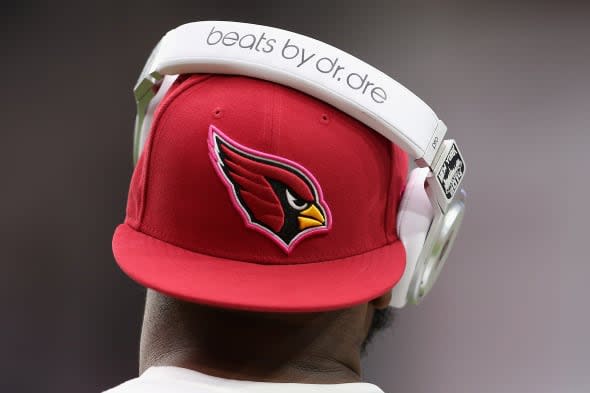Jimmy Iovine welcomes free publicity from NFL's ban on Beats headphones

Despite the NFL's promotional agreement with Bose, a number of big name NFL stars continue to wear Beats by Dr. Dre headphones at football events. Just two weeks ago, San Francisco 49ers quarterback Colin Kaepernick was fined US$10,000 by the league for wearing his Beats headphones to an after-game press conference. Last week, Kaepernick kept his Beats headphones but placed tape over the Beats logo.
So while Bose may technically be the "official headphone of the NFL", the company's deal with the NFL is inadvertently shining a spotlight on Beats. What's more, the ban on Beats headphones helps position the company has a hipper and more upstart brand waging battle against the starched white shirts of corporate America.
So when Beats co-founder Jimmy Iovine was recently asked about the NFL's ban on Beats headphones, he welcomed the attention the ban has created.
Speaking at USC's Global Conversation conference in New York this week, Iovine explained:
We didn't do anything, and now the players are going out and putting black tape on our logo. It's like, I can't believe I'm this lucky. I feel like sending them the tape.
What happened there, you have a tech company that's culturally inept. There's no one at the company that said, 'If you ban these guys, you're going to look bad to the young people, and they're going to look like superheros even though they're just pure capitalists - well they're not pure capitalists, but they're real capitalists and [they] sold that company to Apple - but you're going to make them look like the underdog.
Notably, this isn't the first time a ban has helped a brand. AdAge reminds us that, in 1985, the NBA fined Michael Jordan $5,000 every time he wore Nike Air Jordan sneakers that didn't meet the NBA's dress code. The result? Air Jordan sales skyrocketed.
Shawn Bryant, a former National Basketball Association marketing executive, said it reminded him of another Jordan moment in 1985, when the NBA began fining Mr. Jordan for wearing the first iteration of his Nike Air Jordan sneakers because they violated the league's color regulations. Mr. Jordan was fined $5,000 each time he wore the shoes, and Nike used the outlawed status as a positive in its advertising.
"That was one of the things that really gave an early boost to the Jordan brand," Mr. Bryant said.
"There is a component here where if you're told you can't do it, it becomes a little more appealing to the consumers."
Product placement is one thing, but many companies still haven't learned that you simply can't buy relevance.
Take Microsoft, for example.
Microsoft this year paid the NFL $400 million as part of a 5-year marketing deal. As part of the deal, Microsoft's Surface tablet is now the "Official Tablet of the NFL." Every sunday, football fans can see NFL coaching staffs across the league conspicuously using Surface tablets during game play. Surface tablets are also prominently displayed during in-game studio segments.
But paying for placement will only get you so far, especially when NFL announcers mistakenly refer to Microsoft Surface tablets as "iPads". Hoping to avoid further embarrassment, Microsoft began "coaching" announcers so that they wouldn't make the mistake again. And just this week, Chicago Bears quarterback Jay Cutler called the Microsoft Surface tablet an iPad knockoff.
Money can only take you so far.

